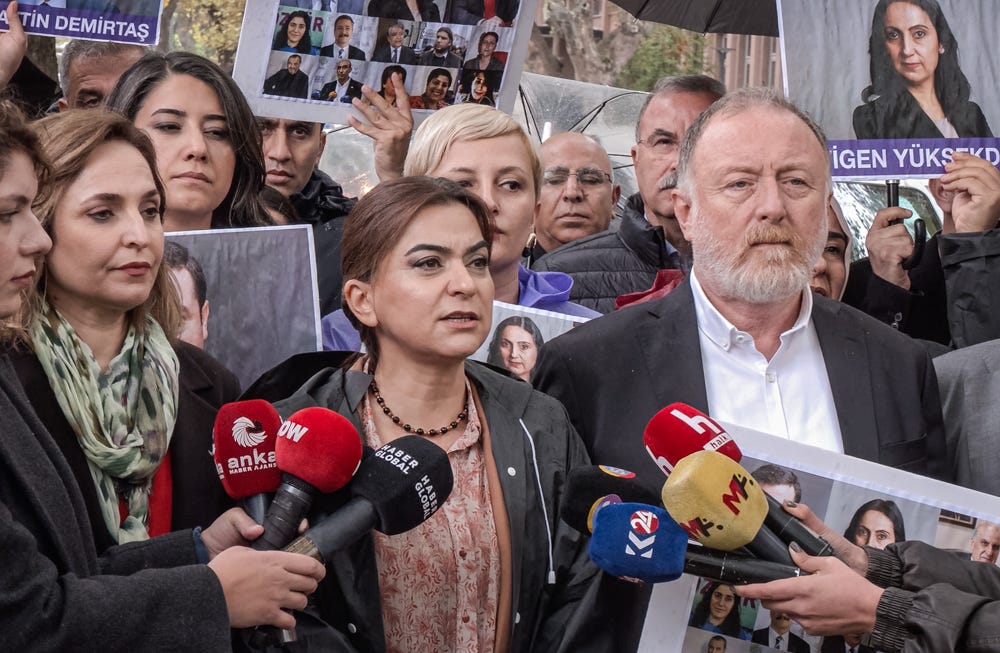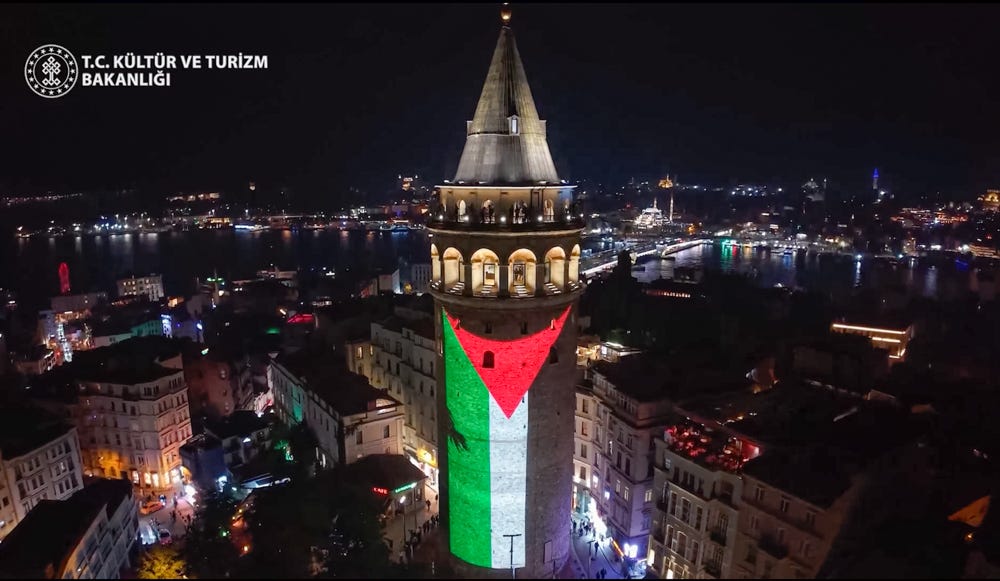The peace process just got merch, and it was quickly banned from online shopping platforms.
As the Star Wars quote goes: “So this is how liberty dies, with thunderous apparel.”
In this week’s recap:
Appeal punctures PKK peace process
3 Turkish MPs detained in Freedom Flotilla
US envoy leans into Syria tensions
Domestic and diplomatic wraps
Celebrity drug test a sigh of the times
Also from us this week:
Zaur Shiriyev outlined the Armenia-Azerbaijan peace talks on Recap radio.
Stüdyo recap is on it! Subscribe here for daily Turkish politics coverage.
Next week: Prof. Seda Demiralp joins our podcast to review the state of opposition politics in Turkey amid the widening CHP crackdown.
Watch the livestream here Oct. 15 at 0800 UTC / 1100 TRT.
All is not well in the PKK peace talks. Amid chatter of a slipping government interest in the process, Turkish officials postponed a concrete concession on the 9-year imprisonment of former HDP co-chairs Selahattin Demirtaş and Figen Yüksekdağ.
DEM Party officials described the move as a blow to reconciliation efforts, though commentators noted the release of jailed politicians remains only one aspect of the broader peace negotiations.
What happened: On Tuesday evening, Turkey appealed a European Court of Human Rights (ECHR) ruling that found the jailing of the HDP co-chairs to be “political” and repeatedly called for their immediate release.
In a social media post, DEM MP Cengiz Çandar said the “objection lodged just one day before the deadline” demonstrated “ill intent” that has “seriously wounded” the peace process.
DEM officials protested the appeal Wednesday in front of the Justice Ministry, where Gülistan Kılıç Koçyiğit, DEM Party parliamentary group deputy chair, said:
“Instead of implementing ECHR rulings … the [Justice] ministry and the government are attempting to manipulate the situation by playing legal tricks to stall for time, as if there were a legal basis.”
CHP MP Sezgin Tanrıkulu also commented on the appeal, calling it a “political conspiracy” in which Demirtaş and Yüksekdağ are the “hostages.”
What it means: The Turkish state and the PKK will likely remain in a deadlock on who implements concrete concessions first in what has so far been a mostly symbolic peace process.
The parliamentary peace commission continued to gather testimonies this week, after MHP deputy chair Feti Yıldız last week said “the time hasn’t yet come” to implement legal reforms.
Meanwhile, much of the rhetoric remains focused on Syria. Speaking in parliament Tuesday, MHP chair Devlet Bahçeli called on PKK leader Abdullah Öcalan to demand that Syrian Kurdish groups disarm and implement the March 10 agreement with Damascus.
Bahçeli added the parliamentary commission could hold a face-to-face meeting with Öcalan on Imralı island “if necessary”, which is what the PKK leader also wants. Yet, even the man who started this initiative with handshakes one year ago acknowledged the difficulties ahead.
“Turkey stands on the eve of a sacred birth. This birth may have pains. There may be misunderstandings. Nerves may fray. Contacts may weaken and distances may grow,” Bahçeli said Tuesday (and yes, this is how he normally talks).
Analysis: Roj Girasun, director of Rawest Research, a think tank focusing on Kurdish issues in Turkey, said the “failure to release Demirtaş constitutes a major obstacle” for the process.
Speaking to Turkey recap, he said this week’s appeal to the ECHR raises pre-existing anxieties and suspicions among citizens and weakens the credibility of negotiations.
“However, saying ‘the process has been derailed’ would be a little too strong because this issue is not only about a single file,” Girasun told Turkey recap. “We are talking about a multilayered process that has dimensions related to Syria, as well as security and political perspectives.”
Asked if the implementation of ECHR rulings was delayed because it might set a precedent for other ECHR rulings involving jailed philanthropist Osman Kavala and former Workers’ Party of Turkey MP Can Atalay, Girasun responded:
“The Demirtaş file undoubtedly serves as a testing ground … But the direction of the process is not directly for democratization. At best, it can be about generating opportunities that could pave the way for democratization.”
“One must not forget that the ruling power often operates on a piecework basis on these issues,” he continued. “That is, it prefers to take separate steps for each file without putting all files into the same basket.”
Israel-Gaza war: 3 Turkish MPs detained in Freedom Flotilla




